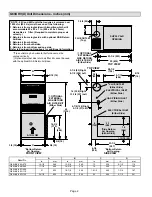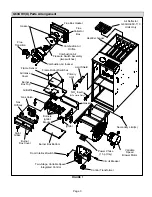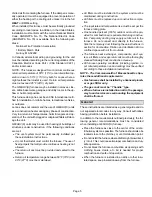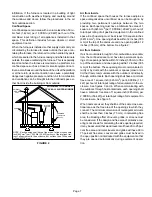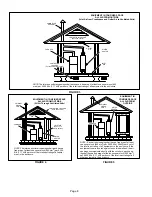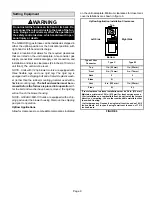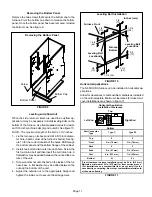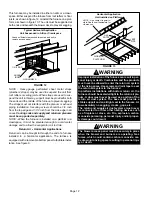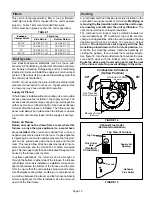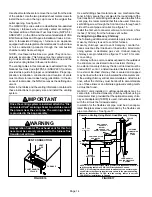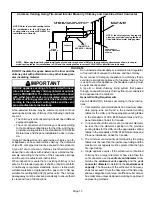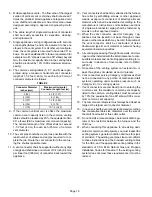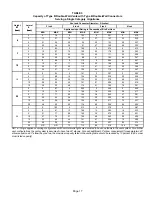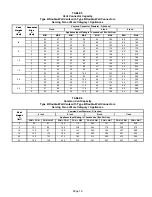
Page 4
G60UHV(X) Gas Furnace
The G60UHV(X) gas furnace is equipped with a two−stage,
variable speed integrated control. This control ensures
compatibility with Lennox’ Harmony III zone control sys-
tem, as well as a thermostat which provides humidity con-
trol. Each G60UHV(X) unit is shipped ready for installation
in the upflow or horizontal position (left or right). The fur-
nace is shipped with the bottom panel in place. The bottom
panel must be removed if the unit is to be installed in a hori-
zontal application. The panel may also be removed in up-
flow applications.
Shipping and Packing List
Package 1 of 1 contains
1 − Assembled G60UHV(X) unit
1 − Bag assembly containing the following:
2 − Screws
3 − Wire nuts
1 − Snap bushing
1 − Snap plug
1 − Wire tie
1 − Vent warning label
1 − Owner’s manual and warranty card
The following items may be ordered separately:
1 − Thermostat
1 − Hanging bracket (for horizontal installations)
1 − Propane/LP changeover kit
1 − Return air base
1 − High altitude kit
1 − Side filter kit
Check equipment for shipping damage. If you find any
damage, immediately contact the last carrier.
Safety Information
WARNING
Improper installation, adjustment, alteration, service
or maintenance can cause property damage, person-
al injury or loss of life. Installation and service must
be performed by a licensed professional installer (or
equivalent), service agency or the gas supplier.
CAUTION
As with any mechanical equipment, personal injury
can result from contact with sharp sheet metal
edges. Be careful when you handle this equipment.
G60UHV(X) units are CSA International certified to ANSI
Z21.47 and CSA 2.3 standard.
In the USA, installation of gas furnaces must conform with
local building codes. In the absence of local codes, units
must be installed according to the current National Fuel
Gas Code (ANSI-Z223.1). The National Fuel Gas Code is
available from the following address:
American National Standards Institute, Inc.
11 West 42nd Street
New York, NY 10036
In Canada, installation must conform with current National
Standard of Canada CSA-B149 installation codes for natu-
ral gas and propane gas burning appliances and equip-
ment, local plumbing or waste water codes and other appli-
cable local codes.
Adequate clearance must be made around the air open-
ings into the vestibule area. In order to ensure proper unit
operation, combustion and ventilation air supply must be
provided according to the current National Fuel Gas Code
or CSA-B149 standards.
Vent installations must be consistent with the venting
tables (in this instruction) and applicable provisions of local
building codes.
This furnace is CSA International certified for installation
clearances to combustible material as listed on the unit
nameplate and in the tables in figures 6 and 11. Accessibil-
ity and service clearances must take precedence over fire
protection clearances.
NOTE − For installation on combustible floors, the furnace
shall not be installed directly on carpeting, tile, or other
combustible material other than wood flooring.
For installation in a residential garage, the furnace must be
installed so that the burner(s) and the ignition source are
located no less than 18 inches (457 mm) above the floor.
The furnace must be located or protected to avoid physical
damage by vehicles. When a furnace is installed in a public
garage, hangar, or other building that has a hazardous at-
mosphere, the furnace must be installed according to rec-
ommended good practice requirements and current Na-
tional Fuel Gas Code or CSA B149 standards.
NOTE − Furnace must be adjusted to obtain a temperature
rise(high and low fire) within the range(s) specified on the
unit nameplate. Failure to do so may cause erratic limit op-
eration.
This G60UHV(X) furnace must be installed so that its elec-
trical components are protected from water.
When this furnace is used with cooling units, it shall be
installed in parallel with, or on the upstream side of, cooling
units to avoid condensation in the heating compartment.
With a parallel flow arrangement, a damper (or other
means to control the flow of air) must adequately prevent


